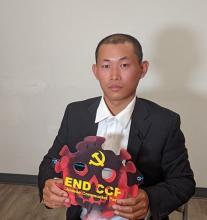A Chinese Horror Story: Rights Defenders Punished in Psychiatric Prison
Safeguard Defenders (SD) report 10-10-2022
Jie Lijian’s heart pounds in panic whenever he sees a doctor in a white coat.
Four years ago, in the summer of 2018, Chinese police illegally locked this young rights defender up for 52 days in a psychiatric hospital simply for calling for the release of jailed workers and students.
Being drugged, abused, subjected to electroshocks and locked up on a mental ward was so traumatic that when he was released, Jie fled China. He was terrified police would send him back. Today, he lives in exile in California, where he continues his rights activism work with the Chinese Democracy Party.
Today, we are releasing the first Chinese translation of Drugged and Detained: China’s Psychiatric Prisons and the updated English report (first released this August) to include Jie’s horror story including a sketch of his psychiatric detention ward and an hour-by-hour account of what life was like inside.
Detailed report download:
(extension://efaidnbmnnnibpcajpcglclefindmkaj/https://safeguarddefenders.com/sites/default/files/pdf/DRUGGED%20AND%20DETAINED%20EN%20UPDATED.pdf)
Please download updated version of Drugged and Detained (EN) here
Please download Chinese version of Drugged and Detained (CN) here

This was Jie’s third time forcibly hospitalized by the police, his first political forced hospitalization was when he was just 17 years old. This is common, many of the victims in the report said they had been sent back repeatedly.
We also used secondary sourced interviews of victims and their families and found 99 people had been locked up in psychiatric wards 144 times in the seven years from 2015 to 2021, covering 109 hospitals in 21 provinces, municipalities or regions across China. A significant number were sent back multiple times, in some cases more than a dozen, while others were kept for years, even for more than a decade.

Mr. Jieli Jan.
Jie’s testimony is valuable as many victims still live in China and are therefore too scared to speak out. He told us that:
- Staff were intentionally cruel. They forced other patients to watch painful ECT procedures
- Staff were well aware that Jie and other rights defenders were political prisoners and openly cooperated with police in illegally admitting them
- The ward was suicide proofed, hard surfaces padded and patients weren’t even given chopsticks at meals
- He was likely only released because he tried to kill himself
Jie’s third incarceration was in Shenzhen Kangning Hospital, a modern facility in the economic boom town of Shenzhen just across the border with Hong Kong. Kangning Hospital cooperates with western institutes, including King’s College London and University of Melbourne.
Like many other victims, Jie was not given a psychiatric evaluation when he was admitted – something that is against China’s mental health law. In fact, Jie overhead the police telling the hospital staff to watch him extremely closely because he was “trouble”.
The ease with which the doctors cooperated with the police indicates that many such “mentally-illed” victims have been sent there before, believes Jie.
Kangning had two separate areas for sectioned patients, one for self-paying and the other, where he was kept, for those sent by the police, some of them homeless people, and others who were activists and petitioners like him.
His ward, on the ninth floor, was a large hall where around 30 beds in groups of four were partitioned off with curtains that were closed at night and opened during the day. Iron bars were on the windows. There was also a recreation and dining area that they were allowed to use sometimes, where they ate and there was a TV.
The area was suicide-proofed. Most of the hard surfaces, such as the edges of tables and benches, were covered in a soft, spongy material. The bathroom door had no locks so staff could always enter. The ceilings were extra high; the light fittings could not be reached and the TV was attached out of reach high up on the wall. They were not given chopsticks, just plastic spoons and bowls, which were all kept in a locked cabinet between meals.
From day one, the staff forced Jie to take medicine – seven or eight types of pills. They never told him the names of the drugs they were giving him. “I’d feel really sick and then a bit dizzy and my sight would blur.” Initially, he tried to resist, but he was too weak. They tied him up and injected him with a sedative.
